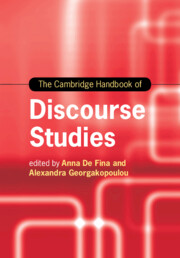Book contents
- The Cambridge Handbook of Discourse Studies
- Cambridge Handbooks in Language and Linguistics
- The Cambridge Handbook of Discourse Studies
- Copyright page
- Contents
- Figures
- Tables
- Contributors
- Preface
- Part I (Con)Textualizing Discourses
- Part II Perspectives and Modes of Analysis
- Part III Discourse Materialities and Embodiment
- Part IV (Trans)Locations and Intersections
- Part V Ethics, Inequality and Inclusion
- Part VI Discourses, Publics and Mediatization
- 27 The Critical Analysis of Genre and Social Action
- 28 Rhetorics, Discourse and Populist Politics
- 29 The Discourses of Money and the Economy
- 30 Corporate Discourse
- 31 Mediatized Communication and Linguistic Reflexivity in Contemporary Public and Political Life
- 32 Discourse Analysis and Digital Surveillance
- Index
- References
31 - Mediatized Communication and Linguistic Reflexivity in Contemporary Public and Political Life
from Part VI - Discourses, Publics and Mediatization
Published online by Cambridge University Press: 28 September 2020
- The Cambridge Handbook of Discourse Studies
- Cambridge Handbooks in Language and Linguistics
- The Cambridge Handbook of Discourse Studies
- Copyright page
- Contents
- Figures
- Tables
- Contributors
- Preface
- Part I (Con)Textualizing Discourses
- Part II Perspectives and Modes of Analysis
- Part III Discourse Materialities and Embodiment
- Part IV (Trans)Locations and Intersections
- Part V Ethics, Inequality and Inclusion
- Part VI Discourses, Publics and Mediatization
- 27 The Critical Analysis of Genre and Social Action
- 28 Rhetorics, Discourse and Populist Politics
- 29 The Discourses of Money and the Economy
- 30 Corporate Discourse
- 31 Mediatized Communication and Linguistic Reflexivity in Contemporary Public and Political Life
- 32 Discourse Analysis and Digital Surveillance
- Index
- References
Summary
This chapter provides an overview of the concept of “mediatization” and its different applications. It distinguishes “institutional,” “social constructionist” and “linguistic-anthropological” understandings of the concept. After defining and discussing each understanding, the chapter draws attention to how the linguistic-anthropological approach may be employed in discourse-analytical research. Specifically, the approach is argued to be highly amenable with a focus on metapragmatics. Much like a focus on metapragmatics reflects language users’ awareness of language use, mediatization may reflect their understanding of the nature of the communication they are engaged in. After providing several examples, the chapter discusses how discourse-analytic methods may further complement the development of mediatization frameworks. Looking ahead, these developments will need to take into account a surge in multimodal content, the increasingly global reach of communications, and ever-shifting social media potentials.
Keywords
- Type
- Chapter
- Information
- The Cambridge Handbook of Discourse Studies , pp. 687 - 707Publisher: Cambridge University PressPrint publication year: 2020
References
Further Reading
Agha’s linguistic-anthropological approach to mediatization emphasizes the importance of commoditized features of communication and their influence in the recontextualization of parts of discourse. It is recommended further reading, especially for a theory of how language/discourse travels across different communication media (cf. Briggs, 2011).
This revised account of the notion of “media logic” underpins (institutional) mediatization research and discusses the discourses of fear as developed and sustained by media logic.
The introduction to this edited volume offers a rich and comprehensive overview of mediatization research, its potential applications and its links with sociolinguistics. The volume overall is an indispensable tool for familiarizing oneself with mediatization research.
This social-constructionist account of mediatization in online discourses on economic affairs proposes the concept of “social mediatization” to account for the ever-growing importance of social media interactions in influencing and shifting modes of participation. It also illuminates the spread and recontextualization of elite terms/discourse in public settings.
The author provides a comprehensive overview of the ways in which technological change in communication has affected newspaper communication and how processes of communication may continue to be changed by technological developments.
References
- 1
- Cited by

